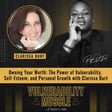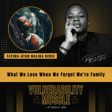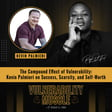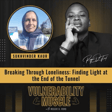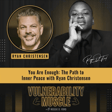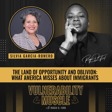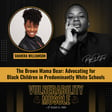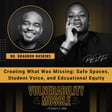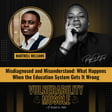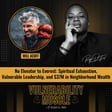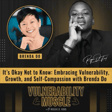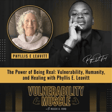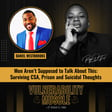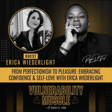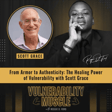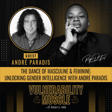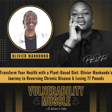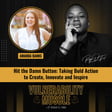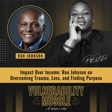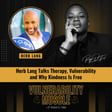Jana's Mental Health Journey
00:00:00
Speaker
But I wasn't mentally applying what they were teaching me. I just said, I'm checking these boxes. I'm, you know, doing the exposure response prevention, starting with my number one, moving up. OK, we got to three today. And then I go back to the hotel and go back to my safe spots, do every ritual again.
00:00:18
Speaker
And I realized that unless I take it upon myself, nobody's going to do it for me. Nobody's able to. pull you out of that pit, they can help you, but ultimately you need to be the one to kind of pull up your bootstraps and say, my life needs to improve and i I'm in control
Introducing Vulnerability Muscle Podcast
00:00:33
Speaker
Welcome to Vulnerability Muscle, the inspiring podcast challenging norms and helping you redefine vulnerability as a strength. I'm your host, Reggie D. Ford. Each episode of Vulnerability Muscle dives into a variety of topics such as mental health, social issues, and mindset shifts.
00:00:51
Speaker
We explore the power of vulnerability and fostering meaningful connections. healing, building resilience, and promoting personal growth. Sometimes these conversations are uncomfortable, but good workouts often are.
00:01:06
Speaker
So join us and flex that vulnerability muscle. Welcome to this episode of Vulnerability
Jana's Background and Advocacy
00:01:12
Speaker
Muscle. I'm your host, Reggie D. Ford. And today I have an amazing guest with me today, Jana Hahn.
00:01:19
Speaker
Jana, with a Bachelor's of Science degree from Liberty University in Interdisciplinary Studies, a specialty in psychology, communications, and theater arts, Jana is passionate about utilizing an individual's unique story to provide peace of mind about OCD.
00:01:35
Speaker
From her personal experience, she advocates the message that pain has a purpose in the state of Tennessee and beyond. As a previous Walt Disney World cast member, she is pursuing performing arts in Nashville and has current has a current profession as a marketing director.
00:01:51
Speaker
In her free time, she is actively involved in the Miss America organization promoting mental health advocacy. Welcome, Jenna. How are you? Thank you, Reggie. I'm doing well. I'm so excited to be here with you today and get to be a part of highlighting mental health awareness with May coming up with Mental Health Awareness Month.
Understanding Vulnerability
00:02:08
Speaker
So, so excited to get to talk today. oh I'm excited to talk as well. And you have a ah fantastic story of um pain to purpose and understanding how how our pain can be a ah driver toward that purpose. And I cannot wait to dive into that
00:02:26
Speaker
But before we get into it, I got a segment called what comes to mind. So you let me know this is on the spot. Just the first thing you think of. OK, what comes to mind when you hear the word vulnerability?
00:02:38
Speaker
Being vulnerable to me is being your true authentic self without putting up those walls. It's not altering anything. It's not putting almost almost a filter on top. It's saying this is This is genuine. This is real. This is no changes.
00:02:52
Speaker
This is it. And so I'm hoping to flex that mo vulnerability muscle today, too. So I'm excited. Let's go. I love it.
Decompression Techniques
00:02:59
Speaker
What do you do to decompress or center yourself if you're feeling stressed or overwhelmed?
00:03:04
Speaker
Great question. I love to be outside, so I like to go for a walk or listen to music. A lot of times if I'm in a space where I can't do that, it's just finding a moment and, you know, breathing, going over what I can, control within myself. What am I doing that's maybe prohibiting me from having that peace or that calm and being able to recenter and find, you know, that that grounding again. That's dope.
00:03:27
Speaker
And then lastly, what is one of your favorite childhood memories? Favorite childhood memories? Um, let's see here. this is a good one.
00:03:39
Speaker
So, okay. So when we were little, we used to live by this hill that went down and when it would snow, my dad would put us in a little, um, laundry baskets and we would sled down the hill and laundry
Childhood and Family Dynamics
00:03:51
Speaker
baskets. So I twin sister and a younger brother and it was the best thing ever. so that was something I will always remember and still think of it super funny and very innovative. Yeah. And nobody falls out. So we're good. where Where'd you grow up? I grew up in ohio Ohio. So I was born in Ohio and then moved to Louisville, Kentucky area. That's where I consider kind of my hometown, but originally was Ohio and then came here to Tennessee about three years ago. Nice. Nice. Okay. So what was, yeah what was Louisville? That's like home of the slugger, home of Muhammad Ali, Kentucky Derby, Kentucky Derby. You got a lot of things going on in Louisville. That's cool.
00:04:24
Speaker
Good place. Yeah. It's good. what What did your your
Early OCD Experiences
00:04:28
Speaker
childhood look like? So you mentioned like was mom, dad, siblings, like how did y'all relate to each other and what was your identity growing up?
00:04:35
Speaker
Yeah, so as I mentioned, I have a twin sister, so I'm nine minutes older, Joy, the way. um Nine minutes older and um we've you know grown up in the same, almost same direction. And my brother is two years younger, so not far behind us.
00:04:48
Speaker
um Great family dynamic, wonderful parents, um always involved in our lives. very involved within the school and the church. And in fourth grade is when I first started experiencing my OCD symptoms.
00:05:00
Speaker
And as parents who they had never experienced anything of mental health um or mental health illnesses, they really didn't know what to do. And that's kind of when everything started. So then I started to show these symptoms and they thought it was a phase or something that I did for a moment. And in reality, it was just the start of the snowball. Wow. Yeah. Wow.
00:05:24
Speaker
So when you say OCD, ah obsessive yes obsessive compulsive
Understanding OCD
00:05:29
Speaker
disorder. so to kind of recap that if anybody's listening obsessive compulsive disorder is you obsess over something and he create you behavior or create a compulsion to make that anxiety go away so you know if you touch something and you think it's dirty you have all this anxiety And you go wash your hands. Well, that behavior is your compulsion.
00:05:47
Speaker
And so you're doing this over and over and over again because you're trying to get that anxiety to go away. But in reality, your amygdala in the front of your brain is being reinforced that I have to do this every time. i have to do this every time.
00:05:59
Speaker
But in reality, that's what you shouldn't do because you're building that habit. And, um, Yeah, it's a monster. OCD is an ugly monster. So that's when it started appearing. And my parents thought about looking into medical care in regards to medication.
Managing OCD: Treatment Options
00:06:13
Speaker
But being so young, you know, i was 10 years old. So they decided to, you know, let time pass. And luckily for me, my symptoms decreased and the family dynamic seemed to return back to normal. It did cause a lot of tension within the siblings and the parents because I was receiving focus and all that care and, you know.
00:06:31
Speaker
The world doesn't revolve around me. So it was a lot of stress there. But then, um yeah, they decreased for a couple years after that. Wow. And so I think OCD is one of those things that people flippantly like throw out there is like i got OCD because I do something and they're organized or they're neat or, you know, tidy.
00:06:51
Speaker
ah But can you explain what those symptoms were like in your life or what started to show early on? yeah And those small things are very valid. Like if you touch something and you think it's dirty or you need to wash your hands or check a light switch or do something repetitively, it's it's normal to have anxiety, but for it to get in the way of your daily behaviors is when it becomes
Impact of OCD on Daily Life
00:07:11
Speaker
an issue. And that's for me when I had to okay, you need to go get help from professionals and go to a partial hospitalization program. And when I was at my peak of the worst symptoms and the darkest I've ever been, i think I felt as though i couldn't help it. as though I had to keep giving into this anxiety and then which led to depression and ah just coinciding of all these things. And I truly thought I lost the person that I was.
00:07:38
Speaker
So i don't know. A lot of people don't know this about the Miss America organization, but I, so I went to treatment um for OCD and anxiety. It was partial hospitalization, meaning eight hours a day. so I'd go, go to sleep, go to treatment, go to sleep. And it was, I remember just laying there in the bed and just thinking, wow,
00:07:55
Speaker
This cannot be life. You know, I have to um apply what I'm learning. And I wasn't educated prior to going to treatment. So being there really, really got me in line to say, OK, this is what my identifying OCD anxiety factors are.
00:08:10
Speaker
how can I, read how can I almost respond to them in a healthy way to still achieve my dreams and still be successful and still be Jana, the one who, you know, always wanted to make people happy.
Miss America Organization: Advocacy Platform
00:08:22
Speaker
And that wasn't going to be taken away just because of anxiety yeah and depression. So the first thing I did when I got out of treatment um from Rogers behavior health, which we have a facility here in middle Tennessee, they're across the country. I,
00:08:36
Speaker
i competed in a local for, um, the Miss America organization because it was a way, age um, I was 20, wasn't 20. Yep. So I was 20. So I was competing and I did it because I wanted to share my story. I was very, very secretive about it.
00:08:53
Speaker
Nobody knew. If you asked me, I would kind of brush it off. You know, I kind of isolated myself during that time period, 2018 to 2020 area. twenty twenty area and um So I use that as a platform to share about OCD anxiety and that you're not alone, that, you know, you can still dress your best, you know, want to wear a beautiful gown, want to present yourself well, but still be able to advocate and realize that everyone has something they're going through. Like I have a mountain, you have a mountain. They're not the same, but we can empathize. We can come together and help each other no matter what that looks like. Wow.
00:09:30
Speaker
Wow. That's um that's powerful. um You mentioned that there was some some family dynamics and tension once you started getting a lot of lot of treatment toward your acd or
Family Strain and Relationships
00:09:41
Speaker
OCD. ac ocd um And I can only imagine like having a twin too and like going through it and and how how that could have gotten in in the way of you two.
00:09:52
Speaker
What did those financial family dynamics look like how they manifest? Yeah. So with my twin sister, i think the biggest thing that I felt between, you know, when I was in the peak of it all and just was very confused and angry at myself, but why this was happening and where on the other hand, she wasn't experiencing any symptoms.
00:10:09
Speaker
And so it almost frustrated me because I thought, how is this possible? you know, we've gone through everything together. We're, you know, in the womb together. And now it's like, I'm facing this, this illness that I feel like is destroying my life. I don't feel like I, myself,
00:10:24
Speaker
And so the sibling aspect was very, very hard to understand because it's often hard to understand something that's not tangible. And so especially for those siblings who don't get that. And then between my parents, um you know, my mother was always with me. She went to treatment with me. She tried her best to understand. And what we didn't know was that, um for example, when you are helping an individual with an OCD disorder um complete that compulsion, you're enabling them. You're preventing them from getting better. yeah And at the time, we just we didn't know that, and we were doing everything we could to, in a way, survive. That's what my mom would say, because you know she would bring me Lysol wipes or she would help me do things, because if not...
00:11:12
Speaker
my world, you know, was over. And um so it took a toll on them within their my parents' marriage. You know, my dad was angry with it because he didn't understand it. Just thought, why can't you be normal?
00:11:23
Speaker
Why can't you break out of it? Just do things like this. But when that anxiety is telling you and when you have that, you know, that feeling it's it's really impossible. So now that we've gone down this road of learning and recovery, now they know what they did wrong and what we can do better and how we can help those around us. And I know that my mom specifically is working with moms who have children with OCD because she didn't know what resources to reach out to when it comes to insurance coverage, what that looks like.
00:11:55
Speaker
um who to talk to simply for emotional, spiritual, who knows, even financial help. And so that's a thing that was very um difficult for us, but yet has become something that, like we kind of mentioned before, pain into purpose. yeah It has given so much purpose and a driving force, not only for their lives, but for mine as well, because what was the worst and held me back has now been a catalyst. It's kind of been a slingshot, per se. That's dope. I love that.
00:12:24
Speaker
It's interesting to me that, you know, because because you think about nature versus
Nature vs. Nurture Debate
00:12:29
Speaker
nurture. And so i think there's shows about taking twins and putting them through these experiments and seeing how one responds versus the other.
00:12:37
Speaker
Have you been able to work with your sister and understand like where your anxiety and OCD came from versus why it didn't present in her or anything like that? Yeah, great question. So we haven't looked specifically between both of us, but I do know that within, you know, these symptoms, they occur within transitional periods.
00:12:58
Speaker
So when I was young, young adolescents, 10 years old, we had just moved to Louisville. So there was a big shift there and it just, you know, had happened for me. And then same thing. late adolescence, you know, late 20 or early 20s, whenever I started to, you know, was in college trying to figure out what I wanted to do for my career.
00:13:16
Speaker
I had just switched schools and I was at a point where nothing seemed certain. yeah And so for me to gain that certainty, I resorted to those compulsions with contamination. And I know um I won't speak directly for her, but I know she's had battles of her own, but they were not the same.
00:13:33
Speaker
in, um you know, mental health illnesses are genetic or um due to environmental factors. So don't know. We might have to look into that. So. No, it's interesting. I think it's really cool. But yeah, I think it highlights to just like people like because she was making that move. And then she did she go to college as well. So people respond differently. Brains respond differently yeah to it could be the same stimulus. It could be the exact same thing happening.
00:14:00
Speaker
you know, somebody hears a gunshot and that gunshot is felt differently. Right. With a hundred people, it's going to be different, a hundred different ways. And so I think that's, that's really important ah to point out, but I'm, I'm super excited though. You've used your platform to advocate for mental health, to tell your story, to uplift other people.
Sharing Mental Health Journey
00:14:20
Speaker
What has been the most revealing thing about this journey for you as you learned your story and been able to to own it in that way? Uh-oh, here comes the vulnerability muscle. So I would say that during the process of sharing my story and being able to advocate, it's realizing that I'm always going to be needing that you know little details of maintaining my symptoms. you know Progress is never complete. You're never perfect. You always have to strive to be better and look at what you're doing negatively and build on top of that, especially with anxiety and depression and OCD and
00:14:57
Speaker
all these things they can manifest in different areas of life. So as it has become better in one area, it starts to formulate somewhere else. And where that might sound scary, it's not as scary because I have the tools that I you know didn't have before and I'm able to identify and also have community.
Managing OCD: Strategies and Tools
00:15:14
Speaker
You know, have like we met at the day on the hill for the National Alliance Mental Illness and immediately we're connected. And so it's cool to kind of meet people and start sharing and realize, oh my goodness, you know, we have so much in common.
00:15:27
Speaker
And yet, who would have thought? Right. Definitely. And so you you said you have resources and you shared with me a ah notebook earlier. Yeah. Right. From a period of time where you were working through your healing process. Do you want to highlight anything in particular in that? Yeah, so this this ah binder was something that I had in treatment.
00:15:47
Speaker
And during that time, to me, it was very contaminated. I could barely touch it. i would basically complete my... um So when you have OCD, you create a hierarchy. And this hierarchy is based on different levels of anxiety. So you have your list here. don't if you can see it. So we have different things about you know walking barefoot, touching money, um touching door handles, stuff.
00:16:11
Speaker
Simple things, maybe drinking from a cup without a straw. So simple task, but it was just, I was super, could not do it. And, you know, you rate them. So I have them as a five, a six, seven, one being anticipating rituals the next day. So, you know, going to bed, ruminating, insomnia, things like that.
00:16:30
Speaker
And the one is the highest for you? ah So one is the lowest and eight was the highest. Okay. And so my eight was cross contaminating, clean and dirty. So that would mean if I touch something and then touch something else in my mind that transfers and it just keeps on going. Yeah. And that was a story about that before.
OCD in Daily Actions
00:16:49
Speaker
Haven't you? Like illustrate it because you, you laid it out so well of like you shake hands and, and just like the ripple effect of it. Can you write illustrate a like real life example? Yeah. So I, um,
00:17:01
Speaker
Oftentimes talk about, let's say I'm on my phone, I took out the trash. Well, I touched the trash can. In my mind, that's very contaminated. Dirty. Who knows what's been there? X, Y, Z. Well, then I touch my phone. i touch the doorknob.
00:17:13
Speaker
Whoever touches the doorknob, then they whatever they touch, maybe they touch the fridge. Well, that's contaminated too. So it's just a ripple effect of... contamination in my brain follows it.
00:17:24
Speaker
It's bizarre. I can just see it It's like I'm wearing goggles and it's, you know, oh, I touch exactly this spot on the paper and I would, I'd be able to, to avoid it. And avoidance is also a ah behavioral compulsion, which who would have thought. So even when you think you're doing something by not touching it you are enforcing in your mind that you shouldn't, you shouldn't be able to interact with it due to anxiety. Wow.
00:17:48
Speaker
Yeah. So this was the binder I had. And honestly, I didn't, I didn't recognize who I was. I would look in the mirror in the evenings and think, uh, I'd be so mad at myself. And i I wouldn't just not even put any makeup on, not put my, I put my hair in a ponytail, barely brush it.
Reflections and Hope
00:18:05
Speaker
And if you know me, it's just, I'm always kind of, that makes me feel good to have my hair done and makeup on and feel good. And I didn't even have the energy to make myself look like myself.
00:18:16
Speaker
I just was like, I'm getting up. This is the best I can do today. We're going to see what happens, and I'll try tomorrow to do the same. um But actually, what I wanted to share – wrote myself a letter. yes Which, cause I, this is like the drama. So this was July of 2019. Okay. And I, um, I had written this because I thought, well, maybe, maybe one day I'll read this.
00:18:44
Speaker
And I'll have come to a spot where I'm no longer feeling the way I feel. Wow. And it makes me emotional because I, you know, I think about how dark it was. Like, you know, i was very passive suicidal. i It was felt like a living nightmare to be awake. And then I'd go to sleep and I couldn't escape it still, you know, in that cycle. And yeah if anybody has experienced anxiety, depression or PTSD or anything of those natures, you kind of get what that's like. Yeah. And, um,
00:19:11
Speaker
So I basically, you know, in the letter said every day, every day so difficult, just even getting out the door. i will never be better or not see things as clean and dirty. I'm just so frustrated. i want to be normal.
00:19:25
Speaker
I know I just sit at dinner and I cry and I feel like I'm dying. um This OCD has control over me and I am fighting against the monsters that no one sees.
00:19:36
Speaker
it seems almost unbearable to face another day. Um, and said, just know when you're reading this, um, how hard it took to get where you are now, it seems impossible, but you're destined to do the impossible things that God designed for you.
00:19:54
Speaker
And OCD is a state of mind and you can learn how to conquer that. So steal your life back. You can do these things and keep going.
00:20:05
Speaker
And at the end, I signed it, Jana, who is dying from all this, but in the end will be okay. Wow. Because I truly was like, I guess. I'm hoping. I don't know, but I'm hoping. Yeah. So, and it just makes me laugh. But I, yeah, back a couple years ago, five, I guess six years ago now, um wouldn't have thought that I'd be able to share with you even this story yet.
00:20:27
Speaker
come alongside other individuals and say, Hey, you're not alone. Use that as fuel. Use it as purpose because now it's become one of my greatest strengths. It's one of my weaknesses, hundred percent, but it's a way that I can connect with people.
00:20:42
Speaker
It's a way that I can get involved with my community. It's a way that I realized that, you know, I, I still need to work on things and I'm able to share that and help others too.
00:20:54
Speaker
It's, So amazing that one. How do you feel reading that? Because it was so powerful to hear, especially toward the end. Yeah, I had to kind of like browse it because was like, oh, there's a lot of stuff in there. um You know, but it's to think about that spot that I was in and to see where it is now is.
00:21:13
Speaker
It's encouraging, and it's I think of those who I watched videos in those moments when I was going through the dark times, and I thought, well, if they can do it, I can do it too. so I'm hoping that our stories and this yeah what we're doing, people can see it because it might not seem like you can get through it in the moment, but piece by piece. I like to say look at that staircase, not the entire – look at the step, not the entire staircase yeah because step by step you'll get where you need to be. So don't rush it.
Reggie's Pandemic Challenges
00:21:41
Speaker
It's not going to be a fast process. Just slowly keep keep going. Keep doing your thing. Wow. It's so interesting. So July 2019 was a period of time in my life for totally different reasons where I was in tremendous darkness.
00:21:57
Speaker
And i had just lost two childhood friends. ah to murder. um And then little did I know the end of that month would end with my grandmother, who was the nurturer in my life dying. yeah And i had, I, at this point it was a strange man and a lot of, a lot of other losses that, you know, were near and dear to me that I was, i mean, I didn't want to get out of bed. i was I didn't even cancel meetings. I would just show not show up. and i don't like Nothing mattered during that time.
00:22:31
Speaker
And so to know that you know for different reasons on a different part of the world, and town or whatever, um we had experiences that were darkness.
00:22:42
Speaker
And I think that highlights the point that you made earlier that you're not alone. right we We have our unique situations and our unique circumstances, but The ways in which we feel, the ways in which some of those things manifest, we have community
Mental Health Resources
00:22:58
Speaker
in that. Right. And so it's so it's so reassuring to have to know that, to know that I hate that it you experienced that. I hate that you had to go through those things. But for anybody listening who may be going through their dark moment and feeling like they're you are alone, you are not.
00:23:16
Speaker
You are absolutely not alone. And if we with our stories, OCD, PTSD, complex PTSD, like you have community out here and there are folks who want to help.
00:23:29
Speaker
There are resources. You talked about some resources that your parents share now right around helping mothers, helping parents yeah with kids. Can you share some of those with folks? Yeah. So I know specifically that my mom has been working with a life coach community. So being able to walk alongside moms who have gone, taken their children to um maybe a mental health therapist and meaning they're able to help them do the small things to control, you know, maybe just time efficiency or being able to,
00:23:58
Speaker
um be organized and those small things can help them be stable enough to then tackle their, their mental diagnoses. Because when you're having all these things going on, you cannot, cannot
Navigating Mental Health Treatment
00:24:10
Speaker
get that forward. So I know that, um, effective, effective functioning coaching is what that's called. And anybody can do that, but no mainly younger children.
00:24:20
Speaker
And then, um, specifically working with organizations like national lines of mental illness, Rogers behavior health, there's a mental health walk this, um, upcoming may, for um for oh for the mental health of National Alliance of Mental Illness. There's too many too my little acronyms. too many um So WALK coming up with them. And then also ah the there's an OCD WALK in October that we do to raise money for the International OCD Foundation.
00:24:44
Speaker
um that oh The International ocd said OCD Foundation is also another resource. I had the opportunity to apply and become an IOCDF advocate, meaning it's a two-year program, and we are you know entrusted with being able to advocate and share the most possible ways.
00:25:02
Speaker
And so that's something i never thought would be possible, yet they are a great resource because without them and without the help of Dr. Liz, who was part of the board at the time, ah wouldn't have found treatment. It's kind of a chain reaction, but um my dad had met her.
00:25:18
Speaker
She recommended Rogers to us, and that's where I went. Because if not, i we you know we looked online, we called people, but everything is so also tricky to get into. It was kind of a matter of...
00:25:30
Speaker
Okay, this is we need some referrals and things. How did you navigate the insurance side of it? Yeah. So a lot of that um was felt on my parents and I know it was a long process to get everything finalized.
00:25:44
Speaker
And i I don't know the details entirely um just because at the time it was almost something I couldn't couldn't really carry um But they um were able to walk alongside us and understand what that looked like and whether it's, you know, financials or
Accepting Support and Taking Control
00:26:02
Speaker
educational aspects. um I know like Rogers and OCDF are really great at explaining things and making it doable. If you think, if you're scared to attempt something because of that factor, don't.
00:26:14
Speaker
And if it's a matter of financials, know that there are organizations and grants out there that can help you do that because it's, we're all, I know specifically are here to help. And that's something I didn't want. I also didn't want to take help from anybody. was like, I can do it by myself. So, yeah and even as we were talking about earlier that, you know, you're not alone.
00:26:34
Speaker
Someone said that to me, I would get angry. I would say, but you don't understand. yeah You do not get it. You don't know what I'm feeling, how dark it is, the feelings that are in my mind, how that I have to keep repeating them.
00:26:45
Speaker
And I would get angry and so angry. When did that shift for you from the anger to, okay, maybe you are being genuine. this Okay, so this is extra vulnerable. So even at the Rogers facility, I was sitting down to get vitals because we have a team of, you have psychologists, psychiatrists, you know, for medication and you have a nurse. So you have a team of people.
00:27:06
Speaker
And I um was so angry that I just, I got up and walked out. I said, I'm sorry, i don't want to be here. And that's not my nature. And I walked outside and just sat stood outside for a moment. And i went back in, you know, obviously kept continuing, but I wasn't mentally...
00:27:22
Speaker
applying what they were teaching me. I just said, I'm checking these boxes. I'm, you know, doing the exposure response prevention, starting with my number one, moving up. Okay. We got to three today. And then I go back to the hotel and go back to my safe spots, do every ritual again.
00:27:38
Speaker
And I realized that unless I take it upon myself, nobody's going to do it for me. Nobody's able to pull you out of that pit, they can help you. But ultimately you need to be the one to kind of pull up your bootstraps and say, my life needs to improve. And I I'm in control of that.
00:27:53
Speaker
So being able to, you know, in my mind, flip that and say, you need to make a change and it's going to be uncomfortable. It's going to be not fun, but it's rather that than living your life in consistent, almost trapped nature.
00:28:09
Speaker
So it was more of a now or never. Yeah. Yeah. You had to trust the process. Yeah. Oh, yes. Yeah. Trust the process big time. Yeah. Oh, my goodness. Yeah.
00:28:19
Speaker
Do you want to highlight or shout out any any people in particular who were helpful in
Support System: Psychologist and Mother
00:28:25
Speaker
that journey? Because like you said, you didn't want to ask for help. Right. But help is what we all need help.
00:28:30
Speaker
Yeah. You know, it in varying degrees, but we all need help throughout our entire lives. You want shout out any those folks who gave you some help? Yeah. Dr. Kevin Chapman. He is a psychologist based in Louisville, and he was the first therapist that I saw. And we were family friends and.
00:28:46
Speaker
was able to work together with that. And he was someone who's walked alongside of me through the start of it until, you know, even now when I run into him, it's like, can you believe back when, you know, but it's it's just funny to me that, um you know, where that can start. So he was a major part. So shout out to Dr. Chapman. um He's a resource in Louisville, Kentucky cards, unpaid, but um but this is me, unpaid, yeah, unpaid, shout Shout out, unpaid shout out. um But he, yeah, very knowledgeable, does a lot with sports anxiety, so great for athletes as well. nice um And then another shout out would probably be um just just my mom.
00:29:22
Speaker
um She you know has kind of taken the ministry that was brought through my journey and wanting to share that with other families. and be that encouragement and be that resource that she didn't have. And that's what I also am hoping to do with my megaphone, my crown, because I wish I could i wish i had somebody that I could look at and say, oh, well, she's talking about her story and she's vulnerable about using Lysol wipes on her body for hours and having chemical burns and walking on paper towels.
00:29:51
Speaker
That was something I felt I had to do, but... She's open about that. And I shouldn't have to hide it because the more you hide it, the worse it'll get. And that's where I was. And so shout out to my mom.
00:30:03
Speaker
Yeah, shout out. And yeah like you said, the worse you hide, it's the shame that we're hiding. We don't want to be seen for that part of us. Yeah. It is just a ah part that needs to love just like any other part of Absolutely.
Miss America and Mental Health Advocacy
00:30:15
Speaker
And so I love that you're highlighting that with your platform, with your megaphone. yeah ah Tell us, like, demystify the the Miss America Corporation or organization for Absolutely. So I get to hold the title of Miss Middle Tennessee, and I have the opportunity to compete for Miss Tennessee this summer.
00:30:30
Speaker
And so the Miss America organization specifically is a scholarship organization. Mm-hmm. So you young women can compete for scholarship funds that go towards their future education or their current education.
00:30:41
Speaker
So I, you know, have the ambitions to, if I need to, i have an undergraduate degree, but hopefully look into doing life coaching or maybe more performance. Um, just being able to have that opportunity is incredible and to even pay off some student loans. So if you're thinking, Oh, well I still have all of this, it can go towards that as well. Wow. um But the to break, yeah also to break that barrier of the stereotype of almost ah the pageant world, it's it's not that they're untouchable and they're on a pedestal as title holders, but we are, you know, without this sash and without this crown, I'm still Jana.
00:31:17
Speaker
I just put it on because people listen to me a little bit more. And with, you know, within that, I get to use that as an opportunity. It truly is. It's the Miss America opportunity and that's what it is to learn communication skills. So we you know have an interview, we, um, community service based. So mental health advocacy, you know, as we've been discussing is, um, my platform and being able to, um we have a talent section, so you get to immerse yourself in what you love to do. So when I got out of mental health treatment, i said, I want to sing again. I want to be on stage.
00:31:49
Speaker
And that was a finding a piece of myself. And so, The talent portion, you know, it was a great opportunity to showcase that on a stage. And, um, yeah, so it's, it's a really a way within my experience to become the best version of yourself and to keep, keep chipping away at who you are and how you can further challenge yourself and better yourself and lead other people around you.
00:32:12
Speaker
um I get excited talking about it because, um You know, it's it's really a it's an honor. And I had always wanted to be a title holder ever since I was a young teenager, but didn't get the opportunity until actually i moved here Tennessee.
00:32:26
Speaker
And so and I'm so glad because it's almost like God was saying you won't be ready until now. Because I was able to have this experience that almost humbled me. in And not that I was prideful, but it took me down and said, okay, you need to realize that everybody has an issue. So it's like treat everybody with kindness, always be understanding, realize that you're... you might be the impact in somebody's day that is a changing point. wow Whether it's a kind word, whether it's a resource, whether it's you know just an encouragement on you're doing a good job work keep going because you never know.
00:33:05
Speaker
yeah and yeah Wow, you never know. You never never know what somebody's dealing with no matter what. circumstance You may find them in or or what they look like. You never know. Yeah. And so I'm curious if the the pressures of the pageant world have increased your anxiety levels or or not and and how
Pageant Pressures and Anxiety
00:33:27
Speaker
you manage that. Yeah. So I think in a way, yes and no, I'll answer yes first. I think it's because when you have a spotlight on you, you are automatically assumed to perform.
00:33:38
Speaker
And within that becomes ah a tendency to almost want to fake things or hide things or be you know almost perfect. But then also that that pressure comes off when I realize being my true authentic self and being Jana, not somebody who is beside me or comparing to the person past or future Miss Tennessees, it's like I am myself and what I bring to the table is my superpower. yeah And so to dim that or to hide that would be a disservice to myself and to those around me.
00:34:08
Speaker
So it's like lean into that, lean into your capabilities and Thank goodness you're different from the person beside you because they are not impacting the community and those around them in the way that you are. So, you know, there is, I'm not going to lie, there is some times where you feel the pressure, but it's just mentally always checking and being able to identify, okay, am i you know, being myself, am I letting this impact me in a negative way with my mental health? You know, really just just being aware.
00:34:36
Speaker
of that. No, that's so good. yeah Good advice too. So you mentioned ah dancing as your talent. You mentioned some singing. Can you tell us about the dancing and how you got
Ballroom Dancing and Inclusivity
00:34:46
Speaker
Yeah, so I grew up watching Dancing with the Stars, one of my favorite shows, and I always aspired to learn one day, and I realized I'm not going to be a pro, I'm not going to be a star, I'm not going to be a guest, so might as well find that middle ground. So they approved ballroom dancing for the Miss America organization, meaning you could do it prior, but you weren't allowed to have a partner. But now they've approved it for you can have a partner on you with stage, and with ballroom, that's just essential for the the intricacy, the the tricks, and to create that partnership which ballroom dancing calls for.
00:35:17
Speaker
And I competed in my first official ballroom dancing competition here in Nashville in January and learned started learning in October. And then they approved it this past fall, and I thought, well, it's a sign. So it was a challenge to say, okay, I used to do singing. I've done it for the past eight eight years on the stage for for local competitions, but now...
00:35:39
Speaker
we need to to kind of switch it up a bit. So I'm so excited to debut ballroom dancing on the Miss Tennessee stage. It's never been done before with a partner. And I also think it all opens the door for inclusivity because girls who didn't think they had a talent who compete in the ballroom dancing world now have a talent. So within even competing at the um Nashville stars ballroom dancing competition, i you know, girls knew that I competed and this was a kind of a dream of mine to do ballroom dancing. And they were like, Oh, I want to do that too. And I'm like, well, you can, you know, everybody's, everybody's different. Every, your talent's different, your story's different, but you can absolutely do it. You know, it's, everybody has their own touch to it. Um, and as you said earlier, like the way that people respond to things is different. So everything you do is your own. So you own that and you run with it.
00:36:30
Speaker
So dope. Yes. I cannot wait to hear how well it goes and that you are paving the way for so many people to now they got a new talent that they can open and show to the world.
Working at Disney and OCD Management
00:36:41
Speaker
Go back, though, because you were a former member with Walt Disney. Yeah. So tell me about that. So right after. So 2019, I was in treatment for, you know, mental health diagnoses. 2019, 2020, actually right started COVID.
00:36:55
Speaker
i actually write start a covered decided to go in person at Liberty University. And this was a huge step. I always felt I was meant to go there, but stayed back due to my anxiety and fear of change and just, you know, that whole, that whole baggage and, um, went in person in January, March was when the world shut down due to COVID.
00:37:17
Speaker
Um, but I still stayed on campus. We just, you know, isolated zoom. Most of the campus had already gone home. um, But after that experience, I was able to get into the Disney college program and I had tried for three years, maybe prior to that, um, because you can only get into it at certain times and it's very competitive.
00:37:36
Speaker
So I was able to get into the Disney college program under the merchandise. So I got to work in all the parks, the castle. um I stayed a little bit longer in hopes of getting and into into entertainment.
00:37:47
Speaker
Um, wasn't in the cards this time, but I think I'm so thankful I'm here in Tennessee and maybe down the road, but, um, Yeah. So I was able to work for the mouse and be immersed in create magic for everybody every day. And I loved learning about the company and about just the customer service and just the environment that makes people happy and what creates that business structure and what is successful. So that was also another thing on my list that I wanted to check off and just able to do, um, big Disney fan. So loved being able to do that and, uh, create magic.
00:38:20
Speaker
Oh, that's dope. And I think there are a lot of case studies and books written about the culture that is created there. And so it it is magical. And it's to be studied. And I'm glad you got that experience. Well, especially coming out of my high-end OCD season, right into that and um amusement park area.
00:38:38
Speaker
I'm not going to lie. i did carry a sanitizer bottle in my in my pocket during my shifts because I was working the cash register, which was one of my one of my hierarchies. you know It was wow one of my biggest things. So it was also...
COVID-19 and OCD Awareness
00:38:51
Speaker
pushing through that and not letting it prohibit me achieving this dream of yeah getting to work for the Walt Disney company. wow So that whole experience in itself was very challenging, but so worth it. But it's like, you're always going to have these moments where you have to choose to fight it because it's never going to go away. So even in that moment, it was choosing to use those tools. So Yeah. Tell me about the time of when COVID hit, because I think that was a ah heightened sense of yeah awareness around germs and things and hand sanitizer and all of this stuff during that period of time that every not everyone, but most people probably experienced.
00:39:30
Speaker
How did that translate for you in that time? Yeah. So during that timeframe, when everybody was noticing germs and things being dirty, that are not dirty, but just that COVID virus, that's how I felt all the time. I was already Lysol wiping things from the store that came into the home.
00:39:46
Speaker
I was already washing my hands repeatedly, Lysol spraying things, avoiding contact with people. So to me, it felt almost like, oh, hey guys, this is what I've been doing all along. Because i had really been so self-conscious of keeping things sanitary and then the whole world had gone on to it. So when it was hard to even get Lysol wipes or paper towels and things like that, it it kind of forced me to start to do without a little bit because due to the high demand, you couldn't really get a lot And Being on a college campus, it was also jerky.
00:40:17
Speaker
So, um yeah, that always is something that individuals like to ask because it was already like I was living in that world of, oh, things are contaminated, have to be safe and clean. And um so, yeah, it didn't, luckily didn't push me into a worser spot per se, but it rather just helped me um demonstrate a little bit more on what it felt like to have those um contamination anxiety triggers. Yeah. Wow.
00:40:44
Speaker
Wow. Wow. Man, I hope we don't ever go back to the a time like that because I think I was probably one that went into overdrive of life. Yeah. How did that affect you with everything? Because you said 2019.
00:40:59
Speaker
Yeah. You had gone through that season. Yeah. That's a good question. i think, honestly, it was the period of time that I needed to to look inward.
Self-Discovery During Pandemic
00:41:10
Speaker
And so i I had started a business recently in that time frame and then you know had these losses and had these heightened triggers from my PTSD. and all I wanted to do was isolate from people.
00:41:26
Speaker
And part of that isolation was the depression, the, you know, stay in the bed for, you know, 24 hours, those type of things. But then i think just a part of my nature and my my ah desire to find hope in my situation, it was a period of like, let me understand things better. Let me understand myself better. And that's when I started to journal and write, which became my book.
00:41:58
Speaker
I started to look into therapy and I didn't commit fully to therapy until maybe late 2020, early 2021, where it was grief counseling. And so things were probably, it might've been 2021 because things are probably opening up a little bit more and I'm starting to understand myself yeah a lot better. Yeah.
00:42:18
Speaker
And I honestly, because so much of my trauma response was go, go, go, work, work, work. Distractions per se. Distractions. Distract myself from all that I'm feeling by producing and working and performing.
00:42:34
Speaker
And that would have probably continued had we not slowed down. So thank goodness, you know, as horrible as it was, right, that pain into purpose. Thank goodness for that time of, yes I mean, again, hate that for you, but look what it produced. Oh, my gosh. Look at where you are now. so yeah wow. And so I look back. Yeah, I look back at that time and think I'm thankful for the periods in COVID because I do not think that.
00:42:58
Speaker
the world would have the awareness that it has today or that I personally would have the awareness that I have today without it.
Transforming Pain into Peace
00:43:05
Speaker
And, and it's, it's, you know, you, you said pain to purpose multiple times and that became the process in my book from pain to passion, passion to purpose, purpose to power, power to peace.
00:43:16
Speaker
And I, and I kept reiterating that, Because it was my process and getting real, like being vulnerable is, is being authentic and real about that pain and sharing that pain when you can with safe people and opening up to, you know, take the, the, the fear from it. And the, the, um, fear that if someone heard this or knew this about me, that they could use it against me. And it's like, we're all human and we're all going through this, this life and it's hard. Right.
00:43:44
Speaker
And it's not, you know, that ammunition against you. It's like, you're right. Like I, that's an area I struggle with. And I will add on to that and saying, it took me a while. I didn't just immediately get out of treatment and hop on that stage and say, right hi, I'm Jan. I struggle with OCD, anxiety and depression.
00:44:00
Speaker
i you know, i hit it for a long time, but I slowly started to share, you know, started with my friends, started with, yeah you know, in what I found in that was freedom So if anybody's listening and you think, oh, I can't just go out to the streets and start sharing my story about my mental health, you know, illnesses. Yeah. Don't worry about it. It's a process. it's Yes. It's slow and you'll so slowly start to feel that strength and that almost empowerment over it because, um but it's not going to be overnight.
00:44:29
Speaker
So I always love to yes let people know that because it wasn't overnight for me. It definitely took time. wasn't overnight for me. You know, wouldn't write out treatment. You would not find me in front of a microphone like this. It's just, you know, it's, it's the time.
Advocacy Approach: Slow and Steady
00:44:41
Speaker
And if you're in the phase at the beginning of that process, that's where also, again, don't give up because you never know how little by little by little you'll end up doing something big and advocating in a way you never thought possible. Yes. So, yeah, trust the process. Yes, trust the process. And like you said, I didn't just go from not talking about things to being on stages and being in front of microphones talking about it. Right, writing your books and it just had that time. Like for me, I think back to some of my early forms of vulnerability, and it was writing songs to myself that I never shared with many people, or if anybody. Right. So write these songs and that would be my expression of vulnerability because the safest person I knew at that time was me.
00:45:28
Speaker
right And then it was like, okay, i'm met a friend and I met another person who I could divulge a little bit more to and see how they react, see how they respond. And it's safety. Right. You were working that muscle. So you were tearing it down to bring it back up. I was flexing yeah so yes it. Yes. So it took a while.
00:45:46
Speaker
And I tell people like vulnerability is going to look different for everybody. Yeah. And and you don't have you're not expected to hop on a podcast or to speak or to write a book about your experience. That's not the goal.
00:45:58
Speaker
It's too to be vulnerable and safe space is enough to heal yeah so that you can then start to connect with yourself and the parts of you that you may not love as much. um And then connect with other people because you're not alone.
00:46:11
Speaker
And when it comes to sharing your story or advocatevocy with advocacy with mental health, sometimes that word sounds intimidating and big. And if you're out there and you're thinking, oh, I want to share and advocate and help others, but have no idea
Storytelling in Advocacy
00:46:23
Speaker
how. yeah Well, what I always say is take a look at your own life and what you are interested in and where you're at in your life and where your interests are and start there, whether that's sharing or having a little drive to raise awareness or doing small things that can slowly um kind of build that community of sharing because you never know whose story you might, what sharing your story might change. um
00:46:48
Speaker
Actually, I don't have it in the binder, but I had a quote printed out and we had each, each patient had a little office. So i was in there every day, just had a desk, um ah a corkboard. And so I would pin things on there, picture my family, um, things that I love to kind of keep me motivated.
00:47:03
Speaker
And it said, one day you'll tell the story of what you overcame, what you're going through now, and it'll become a page in someone else's survival guide. And that has been my anthem, my driving force as, um, you know, overcoming these, these diagnoses as well as becoming a title holder and hopefully the next Miss Tennessee and Miss America, you know, it's just, um,
00:47:24
Speaker
It's being that for somebody else and keep on going because you never know who that might be. So it could be a small little thing you do for somebody or a big gesture and it could be the changing point in their life because I've had those and I know you've had those from somebody. So we could be that for somebody else, yeah which is so, so inspiring and encouraging.
00:47:44
Speaker
That quote that you just brought up, I pinned it to my Twitter at the time. And I didn't tweet anything. I just had it there so I could go back and reference it right there. And it was pinned to my Twitter for years.
00:47:56
Speaker
And it literally, oh, that's so cool. That's so cool. It got me through some days. Like, I'm not going through this for nothing. Right. and And, like, we're here.
00:48:07
Speaker
Right. We're here. And so that's so dope. You mentioned, like, some of those folks, like, that you've inspired. Have you had any stories where people come up to you and say, just thank you for...
00:48:18
Speaker
And those are so, to me, I'm like, I get so excited because I thought, oh, I didn't know anybody was going to watch this. But what I did was a live exposure video.
Positive Feedback and Awareness
00:48:26
Speaker
So basically, um exposure and response prevention is the golden standard.
00:48:31
Speaker
So with OCD, so you expose yourself to what's causing the anxiety and you prevent yourself from completing the compulsion. So for me, getting gas at the gas station was a big, big hassle. It gave me a lot of anxiety touching the handle.
00:48:44
Speaker
Just, you know, I kept in my mind, I think how many people have touched this? What have they touched after that? And I, it just was a no go. And so, um, I had saw Dr. Liz, who I'd mentioned before with the international OCD foundation do a live video explaining, okay, this shoe I had stepped in throw up in and I didn't ever want to wear the shoe again while I'm making myself touch the shoe. Like it's clean now, but it's She said, even with that, I won't touch it. Well, she touched the shoe. She like over immersed herself, which what you're supposed to do to get the highest point of anxiety. So touch it on her face, like just like things that even make a normal person cringe. And so my sister sent it to me and she goes, you should do something like this. And I was like, not.
00:49:22
Speaker
you're kidding. I was like, ah you're scaring me. I was like, I don't think I could. And then, um, I got off of work early and was passing a gas station. and i just had this feeling that I should do the video.
00:49:33
Speaker
So I went and said, you know, did a story just explaining OCD and what exposure response prevention is. And this is me touching the, I grabbed that, that nozzle and I like pumped to the gas. And then I said, I was like, I feel really dirty. And I touched my face, like my hair, so that I really couldn't clean everything, which sounds silly, but I you know rubbed my arms, my phone, the steering wheel.
00:49:55
Speaker
And then the biggest factor was going home and not... going into like cleaning mode. So I had to, you know, go home and prevent everything. But I documented that, posted on my story and I had maybe 20 to 30 Instagram DMs about, I had no idea. i have this as well.
00:50:11
Speaker
Thank you so much for sharing. Can I send this to my cousin who's also been going through something like this? Um, who do you recommend? It's just the smallest questions, but I made it, it was like, if only I did this sooner. Wow.
00:50:24
Speaker
Only did this sooner. And the girl who was crying on the floor thinking she was, her life was over and that the the feelings she had were the only ones in the world was a lie. And that it's just, you know, there's so many people out there who can relate to you and there is help available and you can still, you know, move forward and not be a trapped by these symptoms and these diagnoses. Wow. wow Yeah.
00:50:49
Speaker
That's so amazing. That's powerful.
Superpower: Being Intentional
00:50:51
Speaker
And I'm sure you're going to continue to help people through your story and through your platform. And I cannot wait to see where it takes you. um Before we close out, though, I have ah another segment, just fill in the blank. okay So I'm going to ask a couple of things and you let me know what comes to mind as short or as long of an answer you want. Okay.
00:51:10
Speaker
Vulnerability makes me feel b blank.
00:51:19
Speaker
Self-aware. think that it helps you realize what's truly there versus what the facade is or what you think should be there. It's everything is true. Everything's out there. That's real.
00:51:36
Speaker
My biggest superpower is blank. Intentionality. Intentionality. I think being able to make sure everybody feels seen and heard, not just with, you know, when you walk into a room with a crown and sash, your presence is seen, but making sure that it's felt so that those who come in contact with you understand the purpose, learn something, um you know, feel valued is something that I.
00:52:03
Speaker
I think I try really hard to accomplish and um aspire within my own life as well because I've been there before where i they didn't feel seen or valued and I don't want anybody to feel that way.
00:52:16
Speaker
Wow. If I could tell anyone who lives with OCD anything, it would be blank. It would be Ride the wave of uncertainty.
00:52:29
Speaker
And that was something that Dr. Chapman taught me because when you're in that, you know, almost that wave of anxiety comes over you and you immediately want to react and change something or fix something to make it go away, just ride it out.
00:52:43
Speaker
Just, you know, don't negotiate with it. Don't say, what if I do this? What if I do that? How can I make it better? Just ride, just sit with it. You know, keep going, keep doing your daily things. Just ride that wave of anxiety.
00:52:54
Speaker
And eventually that little voice almost will get quieter and quieter.
Advice to Younger Self
00:53:01
Speaker
Something I'd tell to myself today that I wish I had heard when I was younger is blank.
00:53:11
Speaker
I would say don't hide what you're going through because the suffering and silence is what debilitated me the most at the start of my mental health journey. I wanted to seem as though I had my life together because early, you know, early college, I didn't have anything like this in my life before. So to me, it felt like what is happening, like the sky was falling, like everything was falling apart.
00:53:35
Speaker
And so I, you know, would just would just lean into that. Yeah, that's dope. And then lastly, when I need inspiration, I turn to blank.
00:53:48
Speaker
I turn to listening to other people's stories. I love hearing how someone started in a position and moved forward from that. I love the analogy of a glow stick. You know, you have to break in order to shine. What was that moment for you where you had ah had a moment of success or turned your life or no matter what it might be professionally, um mentally, it's just very, very encouraging. So i always look to those for inspiration because it kind of gives you another kickstart to keep trying out whatever you're doing. Oh, that's dope. This has been great.
00:54:20
Speaker
This has been absolutely
Encouragement and Support
00:54:21
Speaker
fantastic. I appreciate you being here with me. Are there any last words that you want to leave the audience? Any things that you want to promote or share? or share Go. You got the floor. Yeah. So again, thank you so much for having me. It's it's been great to be here with you and share your space and to.
00:54:37
Speaker
you know, get to share, I would just let everybody know that you can receive help. You're not alone. If you want to contact myself or Reggie, feel free to do so. Um, my emails and my messages are always open and, um, your pain has purpose. Yeah. How can people find you? Yeah. So I have my personal Instagram account and then also my title holder one, either one is fine. And then, um, I don't know if we'll post like our emails and things like that for people to if you weren't reach out to, I'd be happy to do that as well. Um,
00:55:04
Speaker
for any contact or and things like that if needed. Awesome. Yeah. Jana, appreciate you. Thank you. appreciate your time. With all the things that you could be doing and all the places you could be, appreciate you being here with me embracing vulnerability.
00:55:17
Speaker
Thank you. Thank you for joining us in another episode of Vulnerability Muscle. If you've enjoyed these conversations around vulnerability, please consider leaving a review.
00:55:28
Speaker
Your feedback not only motivates us to continue to do the work that we do, but it allows other people to witness the power of vulnerability. Share your thoughts on YouTube, Apple Podcasts, Spotify Podcasts, or wherever you're listening from.
00:55:43
Speaker
And don't forget to spread the word. You can follow us at vulnerability muscle on Instagram and me personally at Reggie D. Ford across all platforms. Visit vulnerability muscle dot com for additional resources and support.
00:55:57
Speaker
And remember, embracing vulnerability is not a sign of weakness. It is the source of your greatest strength. Sometimes it's uncomfortable, but most workouts are.
00:56:07
Speaker
So keep flexing that vulnerability muscle.

